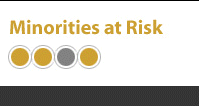The MAR Project
The Minorities at Risk (MAR) Project is a university-based research project that monitors and analyzes the status and conflicts of politically-active communal groups in all countries with a current population of at least 500,000. The project is designed to provide information in a standardized format that aids comparative research and contributes to the understanding of conflicts involving relevant groups. Selected project materials on more than 284 groups (the MAR database and codebook as well as detailed historical chronologies) are available through this site for researchers, public officials, journalists, students, activists, and others interested in the topic.
The All Minorities at Risk (AMAR) project addresses selection bias concerns identified in the MAR database. AMAR builds on MAR but uses a new set of selection criteria -- based on the concept of "socially relevant" ethnic groups, rather than groups that are "at risk" -- to identify an expanded list of nearly 1,200 ethnic groups, over 900 of which were not in the original MAR dataset. From this list, the project created a new dataset -- the AMAR dataset -- that is more representative of the universe of socially relevant ethnic groups.
The Minorities at Risk Organizational Behavior (MAROB) dataset is a subsidiary of the MAR project. It collects data on 118 ethnopolitical organizations representing MAR groups in the Middle East and North Africa. [More]
MAR Data
The MAR project maintains data on 284 politically active ethnic groups. The centerpiece of the project is a dataset that tracks groups on political, economic, and cultural dimensions. The project also maintains analytic summaries of group histories, risk assessments, and group chronologies for each group in the dataset. [More]
AMAR Project
The AMAR project was introduced in 2014 in order to addresses selection bias issues identified in the MAR dataset. The AMAR project overcomes these concerns by: 1) introducing a new set of selection criteria for ethnic groups that is based on "social relevance" rather than discrimination or political mobilization; 2) using this criteria to generate a list of nearly 1,200 ethnic groups, over 900 of which are not in the MAR database; and 3) using this list to build a new dataset -- the AMAR database -- that combines a random, statistically weighted set of 74 new ethnic groups and the original MAR groups to create a more representative sample of the universe of socially relevant ethnic groups. Researchers can use the AMAR dataset to re-examine MAR analyses and the relationship between ethnicity and violence, as well as to address new questions that previously could not be explored with extant data, such as the causes of ethnic mobilization and the relationship between ethnic heterogeneity and conflict. [More]
MAROB Data
The Minorities at Risk Organizational Behavior (MAROB) dataset is a subsidiary of the MAR Project. Initiated in 2005, the purpose of the project is to answer fundamental questions focusing on the identification of factors that motivate some members of ethnic minorities to become radicalized, to form activist organizations, and to move from conventional means of politics and protest into violence and terrorism. Focusing initially on the Middle East and North Africa, the MAROB project provides information on the characteristics of those ethnopolitical organizations most likely to employ violence and terrorism in the pursuit of their perceived grievances with local, national, or international authority structures. [More]
|


![]()


